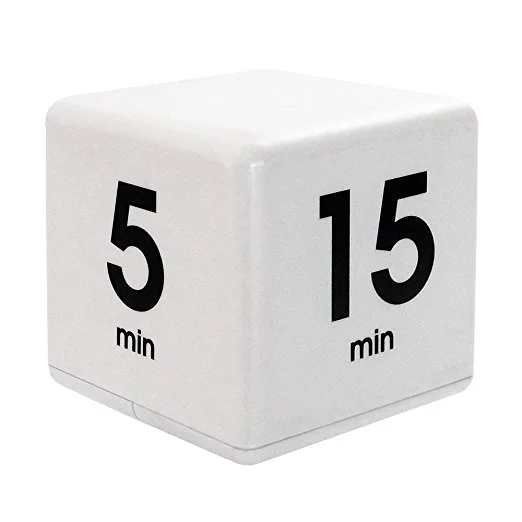Can I tell you a secret?
I’m naturally lazy!
No joke… my natural state of mind is to chill! I love taking naps. I love mindlessly scrolling Instagram. I love binging on Netflix.
Don’t get me wrong, there is a time and a place for all these things, BUT the reality is I can’t just chill for the rest of the days of my life. I mean, I guess I could, but I have bigger dreams and aspirations for myself.
So, for years I thought I could just will myself to get sh*t done.
I could.
I did.
It was exhausting.
It wasn’t fun.
It actually wasn’t as rewarding as I thought it would be.
I knew I needed a much better way.
If you know me, you know I love a good plan, but I also love a good dose of woo-woo. So I looked to both areas to find the keys to mastering time management.
Ready? Here we go!
1. Compete With Time
My husband has this life mantra, “If you wait until the last minute to do something, it will only take a minute.” I’ll tell you, it drives me crazy because he’s stressed me out with his last-minute antics, but there is something to it… things take as long as you allow them to take.
WHAT?!?!
I know. I know. But let me give you an example… I use to meal prep on Sundays. I would take my time getting all the ingredients together, fixing and packaging every meal. I’d fix one thing. Take a break. Check Instagram. Flip through a magazine. Then start on something else. It literally took me most of the day to get done. One Sunday, I had something to do and had to move my meal prep to Monday, after work. To my surprise, it only took me less than two hours to prep the same amount of food.
It blew my mind!
Our brains are tricky. They believe whatever you tell them, so if I’m telling my brain I have all day to cook, guess what… I’ll spend all day cooking. But if I only have a limited amount of time, you can move into turbo gear and get it done.
One of the ways that I master this is to set a timer and see how much I can do in that time.
How many emails can I clear out?
How much writing can I do?
How much content can I create?
How much of the fridge can I get clean?
How quickly can I get groceries? Note: I always wanted to be on Supermarket Sweep when I was younger, so it’s always fun for me to play this game.
So many things…
Here’s a timer that I LOVE:
It’s fun and it works!
Make time a game. Make time fun. Use it to your advantage.
2. Transition Better
Our culture has trained us to move from one thing to the next as fast as possible. In fact, we think multitasking is a badge of honor. Honestly, it doesn’t work. New research has shown that you get more done when you move from one thing to the next.
Not just that, you get more done when you finish one thing and give yourself a few minutes to transition into something new. We love closure! We love knowing we’ve finished something. So adding in a time for transition can save you some valuable time.
How this works: As you finish one thing, give yourself a few minutes to acknowledge the work you’ve done. Think about what went right, and if there were any lessons learned. Then think about what you’re about to start. Ask yourself what kind of energy and attention you want to bring to this next project. What outcomes do you want? How can you show up as your best self? Take some deep breaths.
Then GO!
I’m not suggesting taking hours to transition… this is just a few minutes. This practice is a total game-changer!
3. Prioritize
Raise your hand if you’ve been here before… you look at your to-do list in the morning. You feel overwhelmed. You start on your to-do list. You feel overwhelmed. You look to see what you want to tackle next. You feel overwhelmed. You spend time avoiding your list. You do another task, one that wasn’t on your list. You feel overwhelmed. You end your day by looking at your list and realizing you didn’t really get much done. You feel like you’ve failed yourself. You lose motivation. You wonder when you’re going to feel like you’re not drowning.
Everything is vying for your attention and to become a priority. Your phone is constantly buzzing at you, and you get pop-up alerts on everything from gas price dropping to emails and everything in between.
Everything can’t be a priority!
I have a running to-do list that's several pages long. It’s how I keep track of the things and ideas that I want to do. However, if you looked at my daily list there are only three things. Yes, just three things per day. It helps me keep a laser focus, and helps me to feel in complete control of my to-do list, instead of the other way around.
What I have also found is by having three priorities a day, I can start to see the difference between things that HAVE to be done, and things that would be nice if it were done. This is another layer of prioritization.
The key with mastering anything is to do it consistently. Find something that works for you, and give it your best.
Ready to tackle a goal? Join me in my 30-day program, Goal Getter! Goal Getter is designed to help you gain more time and energy by giving you short, daily insights to productivity and motivation. Plus, you'll make progress on one goal you've been sitting on. It's on sale right now! More info here: Goal Getter








